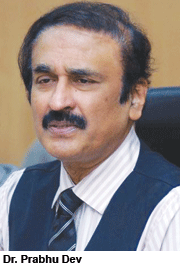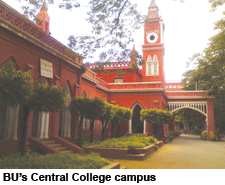 The tumultuous reign of Dr. N. Prabhu Dev as vice chancellor of Bangalore University (BU, estb.1964), which has 600 colleges in Karnataka with an aggregate enrolment of 700,000 students affiliated with it, ended four months prematurely on October 13 when he submitted his resignation to Karnataka governor and ex officio BU chancellor H.R. Bhardwaj. Prabhu Dev’s three years and eight months in office were notable for daily headlines in the press for his cat fights with BU registrar B.C. Mylarappa over reforms and new initiatives at the 48-year-old varsity whose academic reputation is at its nadir. Addressing media persons after tendering his resignation, Prabhu Dev said that there had been an “onslaught” against him and an “atmosphere of hatred” had enveloped the university.
The tumultuous reign of Dr. N. Prabhu Dev as vice chancellor of Bangalore University (BU, estb.1964), which has 600 colleges in Karnataka with an aggregate enrolment of 700,000 students affiliated with it, ended four months prematurely on October 13 when he submitted his resignation to Karnataka governor and ex officio BU chancellor H.R. Bhardwaj. Prabhu Dev’s three years and eight months in office were notable for daily headlines in the press for his cat fights with BU registrar B.C. Mylarappa over reforms and new initiatives at the 48-year-old varsity whose academic reputation is at its nadir. Addressing media persons after tendering his resignation, Prabhu Dev said that there had been an “onslaught” against him and an “atmosphere of hatred” had enveloped the university.
Hitting out against his bête noire Mylarappa (who has a case pending against him for abusing a police officer), Prabhu Dev accuses the registrar of continuously stalling all reform initia-tives at the university. “The Bangalore School of Economics was sabotaged; the School of Communication was not allowed to take off, and undergraduate exams have been postponed by three weeks…,” he says.
The “atmosphere of hatred” and “onslaught” are references to the string of controversies which have been plaguing this once highly-reputed university during the past year since Mylarappa, an academic of provincial antecedents, was appointed registrar. In December last year, 150 students led by the ABVP (Akhil Bharatiya Vidyarthi Parishad) — the ruling BJP govern-ment’s students wing — laid siege to the university’s Central College campus protesting discrepancies in marks cards. This agitation was followed by a spate of demonstrations and rallies staged by postgraduate students and non-teaching staff on BU’s sprawling 1,100-acre Jnana Bharathi campus. At the time, Prabhu Dev had accused Mylarappa of orchestrating the protests in connivance with some university syndicate members, a daily slugfest between the registrar and vice chancellor gleefully reported in the media.
 With the top bu management preoccupied with petty politic-king and courting controversies, infrastructure facilities and academic standards at the university (annual budget: Rs.260 crore) have gone from bad to worse. A surprise inspection visit to the university’s Jnana Bharathi campus on August 9 by the state’s higher education minister C.T. Ravi, law minister S. Suresh Kumar and higher education secretary Siddaiah, unear-thed shocking conditions — over-crowded hostels with more than four students in tiny rooms; choked toilets, and kitchen and dining facilities overrun by rats and roaches. “Let alone hygiene, even basic facilities provided here are disappointing. We will take this up with the chief minister and governor,” says higher education minister Ravi.
With the top bu management preoccupied with petty politic-king and courting controversies, infrastructure facilities and academic standards at the university (annual budget: Rs.260 crore) have gone from bad to worse. A surprise inspection visit to the university’s Jnana Bharathi campus on August 9 by the state’s higher education minister C.T. Ravi, law minister S. Suresh Kumar and higher education secretary Siddaiah, unear-thed shocking conditions — over-crowded hostels with more than four students in tiny rooms; choked toilets, and kitchen and dining facilities overrun by rats and roaches. “Let alone hygiene, even basic facilities provided here are disappointing. We will take this up with the chief minister and governor,” says higher education minister Ravi.
Academically, the situation is no better. Faculty shortages, caste-based faculty appointments, outdated curric-ulums and poor learning outcomes have plunged the university’s reputat-ion into the pits. These problems are compounded by constant political interference in the appointment of members to the university’s syndicate — BU’s highest decision-making authority.
“Persistent political interference has ruined Bangalore University. Corruption is rampant and caste and political controversies abound. Prabhu Dev was enthusiastic and had some good ideas about reforming the university but didn’t find any support in the syndicate. The first reform initiative required is autonomy of the BU syndicate whose members should be renowned educati-onists — as provided by the Karnataka State Universities Act, 2000 — rather than political appointees. Secondly, faculty appointments must be made transparently on merit; the number of academic departments needs to be reduced and democratic processes of governance and accountability estab-lished. The problems of the university are manifold and run deep. Time is running out,” says Prof. A.S. Seetharamu, education advisor to the Karnataka government.
Meanwhile, the state government has appointed N. Rangaswamy, interim vice chancellor who has promised his stint “will be free of controversies” and he will ensure “decisions on important issues are speedily taken”. But as with his predecessor, good intentions are unlikely to be translated into reality given the deep rot that has permeated the foundations of this once reputed university.
Summiya Yasmeen (Bangalore)